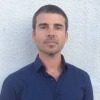In a few words, can you tell us about yourself and how you found your way to the academic field?
I'm the Clinical Director of the Legal Clinic on Digital Rights and Human Rights in Cyberspace, a joint venture of the Cyber Security Research Center and the Clinical Legal Education Center. I hold a BsC in physics & cognitive science and and LLB both from the Hebrew University of Jerusalem, and a M.A. from the European Master program in Law and Economics. I'm a member of the Israeli Bar association since 2012. Prior to my current position I worked at the Israeli Ministry of Justice, as a legal counsel at the Consulting and Legislation Department, and specialized in Constitutional Law, mainly Freedom of Information.
What is the main core of your research? Can you give an example or two? How is it related to cyber security?
In the clinic, we focus on promoting human rights in cyberspace under the Israeli law, and offer meaningful legal education in Cyber Law to our students. We offer legal aid to individuals whose rights were violated in cyberspace, and represent them in legal procedures. In addition, we participate in legislation and administrative procedures that effect human rights in cyberspace in Israel.
Why did you choose this area over all others? Did your personal or professional background lead you to it?
Since the beginning of my legal career, I was mostly interested in constitutional law & human rights. Cyberspace offers many challenges in both these legal fields. It demands redefining traditional human rights in accordance with the new environment, and raises new legal and ethical questions, yet to be answered. My current position allows me to put to work my scientific background, which is a great advantage into my legal practice.
Do you think that in this cyber age these issues are even more complex compared to other times in history? If so – in what ways?
I find (at least) two main challenges in cyberspace today that demand rethinking on the existing legal tools that are used for the protection of human rights. First is the scope of legal protection individuals should have from private actors, as most of the powerful actors in cyberspace are private entities. Second is the need to form international effective mechanisms which can offer remedies to harms caused in cyberspace, in the speed and scale of cyberspace.
After explaining the main core of your research, what do you think is the solution? What is the proper model for that? Is it applicable?
I believe an interdisciplinary approach is the key to form a healthy and safe cyberspace. Policy makers should to be better informed about the dangers cyberspace or its regulation entails to human rights, and their limits and weaknesses. Scientists should be more aware to the harmful impacts the architecture of cyberspace or AI might have on society, and their ethical consequences.
What is the next phase in your professional life?
I hope to take part in creating a multi-disciplinary team that engages in research of the impacts cyberspace has on our society, and aims to be a meaningful actor that promotes technological and legal structures that will best protect human rights in cyberspace.
What is your message to the public?
When it comes to cyberspace - We should probably think it through more carefully.


